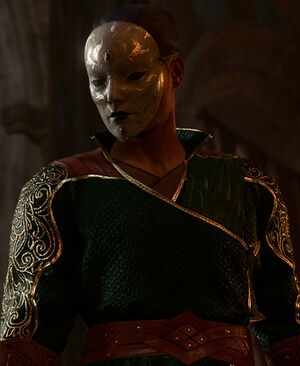Ad placeholder
Uktar: Difference between revisions
(infobox) |
No edit summary |
||
| Line 56: | Line 56: | ||
''Give him Viconia's key'' | ''Give him Viconia's key'' | ||
* "''DeVir''. Now what would a servant of Lady Loss be so keen on keeping safe ?" | * "''DeVir''. Now what would a servant of Lady Loss be so keen on keeping safe ?" | ||
===Under Lock and Key (gold rewards)=== | ===Under Lock and Key (gold rewards)=== | ||
Revision as of 10:54, 20 May 2024
| Uktar | |
|---|---|
| Information | |
| Title | Guild Bursar |
| Race | Human |
| Hometown | Baldur's Gate |
| Occupation | Bursar |
| Faction | The Guild |
Bursar Uktar, or simply Uktar is a human bursar for the Guild. He appears during Act Three, found just before the entrance to the bar in the Guildhall.
Overview
Background
Uktar serves The Guild as its elected bursar[note 1] and works directly with Nine-Fingers Keene to manage its financial affairs. His name also appears in the text of multiple books which discuss Guild activities in recent (game world) history.
Gameplay
- Uktar has no special combat abilities. He will cower and not enter the initiative order if combat is started nearby.
Involvement
Uktar can first be found inside Nine-Fingers' office, arguing with her about an orphanage that has fallen behind on its payments and how they should resolve the matter while also upholding the Guild's reputation. At a break in the conversation, Uktar will notice the player's presence and reprimand them for listening in, before Nine-Fingers takes over as being the focus of the conversation.
Afterward, when starting a conversation with Uktar for the first time, players can pass a History check to 'ponder where you know the name from.' Passing this check will reveal that "Uktar" is the 11th month of the year, more commonly known as 'the Rotting', the time in which all things decay and die.
Vault Key Business
Uktar offers a ransom to players who bring him vault keys for the Counting House -- but only if the contents of the corresponding vault remain untouched. For each one the player delivers to Uktar, he responds with a unique comment corresponding to the previous owner of the key. This comment is the same whether or not the player looted the vault themselves.
Give him Cazador's key
- "Ah. A rather ancient patron of the Counting House. He has accrued quite a bit of interest, I'd wager."
Give him Gortash's key
- "Ah, the would-be Duke! I'm sure he parted with it on good terms."
Give him Glitterbeard's key
- "Glitterbeard. He was given mastery of the counting house over me, you know. Well deserved, wouldn't you say?"
Give him Grey's key
- "Wonderful, thank you."
Give him Lady Jannath's key
- "A fine and noble house. Their funds will serve the city, as they would wish"
Give him Lorroakan's key
- "The great wizard. I will be interested to see what manner of curiosities he deems worth locking away."
Give him Nine-Fingers's key
- "A most peculiar key to have in your posession. I wonder who it belongs to. Here is your compensation."
Give him Ravengard's key
- "The returning hero of Elturel. He's the philanthropic sort, so I'll assume this was a gift, yes?"
Give him Viconia's key
- "DeVir. Now what would a servant of Lady Loss be so keen on keeping safe ?"
Under Lock and Key (gold rewards)
When the player delivers a key to Uktar that belongs to an *unopened* vault, they will receive a gold reward along with the usual unique line of dialogue. A pop-up - similar to what happens when a quest awards an item - will appear after the player exits the conversation with Uktar. Even though no corresponding quest appears in the journal, the text on these pop-ups is labeled as "Under Lock and Key."[note 2]
"We sold [Character]'s vault key to Guild Bursar Uktar."
- Cazador - 339 Gold
- Gortash - 333 Gold
- Glitterbeard - 334 Gold
- Grey - 317 Gold
- Lady Jannath - 354 Gold
- Lorroakan - 331 Gold
- Nine Fingers - 300 Gold
- Ravengard - 329 Gold
- Viconia - 325 Gold
